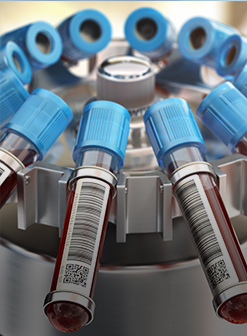What does a centrifuge machine do?

What does a laboratory centrifuge machine do?
A centrifuge machine can be described as a machine with a rapidly rotating container that applies centrifugal force to its contents. There are multiple types of centrifuge, which can be classified by intended use or by rotor design:
Types by rotor design for centrifuge;
Fixed-angle centrifuges are designed to hold the sample containers at a constant angle relative to the central axis.
Swinging head (or swinging bucket) centrifuges, in contrast to fixed-angle centrifuges, have a hinge where the sample containers are attached to the central rotor. This allows all of the samples to swing outwards as the centrifuge is spun.
Continuous tubular centrifuges do not have individual sample vessels and are used for high volume applications.
Centrifuge Types by intended use:
Laboratory centrifuges, are general-purpose instruments of several types with distinct, but overlapping, capabilities. These include clinical centrifuges, microcentrifuge, microplate centrifuge, spin centrifuge, superspeed centrifuges and preparative ultracentrifuges.
Maxilab Biotechnology MS3-MaxiSpin8 Mini Spin Centrifuge
The instrument equipped with combined rotor and several types of tube work for 1.5ml/ 2.0ml / 0.5ml / 0.2ml tubes, 0.2ml x 8 PCR tube strips at the one cycle.
MS3-MaxiSpin8 Mini Spin Centrifuge
Maxilab Biotechnology MS3-MaxiPlate2 Microplate Centrifuge
Microplate Centrifuge is specially designed for the 96-hole microplates. It can quickly spin down droplets and condensation in the microplate.
MS3-MaxiPlate2 Microplate Centrifuge
Maxilab Biotechnology MS3-MaxiCen12 Mini High Speed Micro Centrifuge
MS3-MaxiCen12 Mini High Speed Micro Centrifuge has compact appearance design with high rotor speed and low noise.
MS3-MaxiCen12 Mini High Speed Micro Centrifuge
You can contact with us for more information and products.
info@maxilabbio.com
